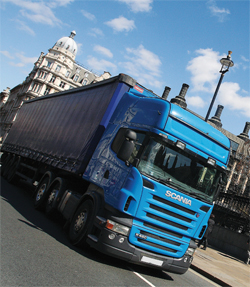
By Andy Stewart
Photography David Humphries
Several politicians and cycling campaign groups are urging London mayor Boris Johnson to issue a ban of commercial vehicles in the capital during rush hours to reduce the number of cyclists injured or killed in accidents.
The calls followed a string of six cyclist deaths in the city in the space of two weeks during November.
In an open letter to the mayor, former Olympic cyclist and British Cycling policy advisor Chris Boardman said the time had come for those in charge to make “tough and critical decisions” regarding the city’s stance on HGVs, otherwise “more lives will be put at risk”.
Boardman pressed Johnson to initiate a similar road use policy to that used in the centre of Paris, where trucks have restricted access during peak times. According to the Prefecture of Police of Paris, there were no cyclist deaths in the French city during 2011.
“London has an opportunity to emulate and surpass Paris and to lead the way for the other ambitious cycling cities across Britain,” Boardman said. “Let’s not waste this opportunity to do something now.”
However, Johnson was quick to state he was not convinced banning HGVs from London was the correct way forward. In an interview with Vanessa Feltz on BBC London 94.9, he said he was “by no means satisfied” such a scheme was the solution. He pointed out that instigating restrictions on trucks in the capital would damage local businesses and cause a “serious influx as soon as the ban was lifted”.
The Freight Transport Association (FTA) backed Johnson’s reservations that a ban would not be effective, stating the idea was unachievable and failed to recognise the role commercial vehicles play in supplying and servicing towns and cities.
“FTA believes the idea of banning HGVs from a city like London in peak hours is naive and not commercially viable,” said the Association’s head of urban logistics policy, Christopher Snelling. “It would mean massive economic implications for the shops, businesses and residents of the capital. It would also create new safety issues as one lorry is replaced by about eight – not to mention the increased congestion and air pollution that would result,” he added.






